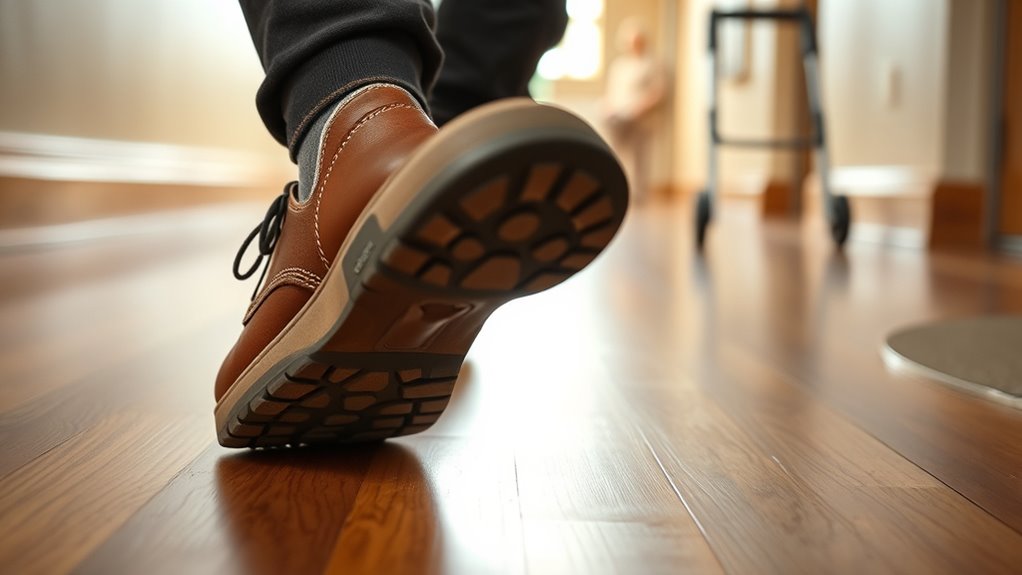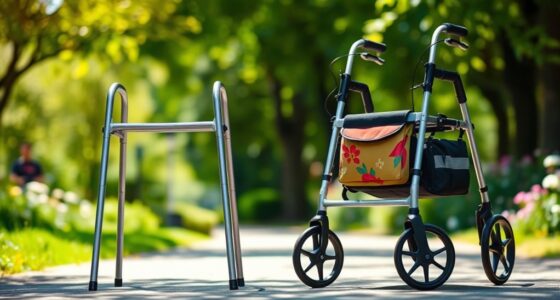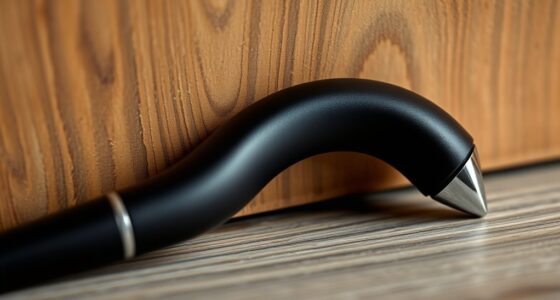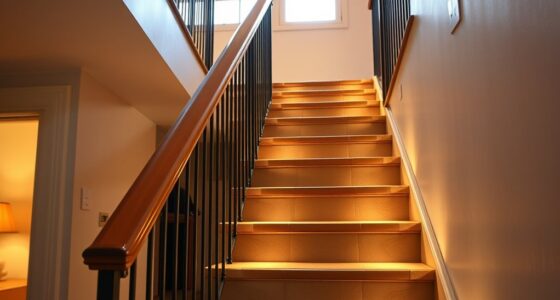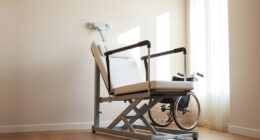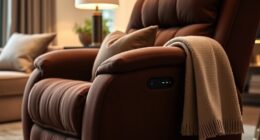Choosing the right shoes is key to preventing falls as you age. Look for footwear with sturdy soles, good grip, and low heels to provide stability and reduce slipping. Make certain your shoes fit well, snug around your heels and midfoot, to avoid twisting or discomfort. Shoes with ankle support and cushioning can also improve balance and absorb shock during movement. Keep safety features in mind, and you’ll find ways to stay steady on your feet. If you keep exploring, you’ll discover more tips to stay safe.
Key Takeaways
- Select shoes with sturdy soles, good grip, and low heels to enhance stability and reduce fall risk.
- Ensure footwear fits snugly around the heel and midfoot for secure support during movement.
- Avoid shoes with flimsy, slick, or overly flexible soles that can cause slips and loss of balance.
- Choose shoes with ankle support and cushioning to improve comfort and prevent sprains.
- Opt for supportive styles that balance safety features with comfort to encourage regular wear and activity.
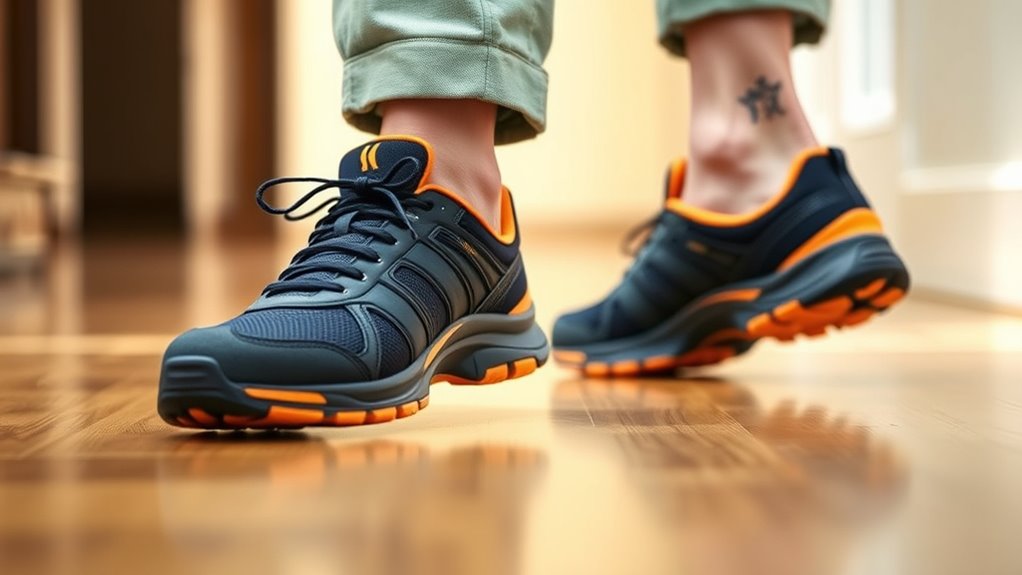
Have you ever stopped to contemplate how much your footwear impacts your daily life? It’s more than just a matter of looking good; the shoes you choose can considerably influence your safety and overall well-being. When it comes to preventing falls, especially as you age, understanding that styles matter and fit matters becomes essential. The right shoes should support your movements, provide stability, and reduce the risk of slips or trips. If you’re not paying attention to these details, you might be unknowingly putting yourself at risk every time you step out the door.
First, let’s talk about styles matter. Not all shoes are created equal, especially when it comes to safety. Sneakers with a sturdy sole, low heels, and good grip are typically the best choice for everyday wear. Avoid shoes with flimsy or overly flexible soles that can compromise your balance. High heels, flip-flops, and shoes with thin or slick soles might look stylish but are dangerous options for preventing falls. When selecting footwear, focus on shoes designed for stability and support rather than just aesthetics. It’s about finding a balance between style and function so that your footwear encourages confidence with each step. Incorporating appropriate footwear styles can significantly reduce fall risks and improve safety. Wearing shoes with non-slip soles can further enhance safety by providing better traction on various surfaces. Choosing shoes with adequate ankle support can also help prevent ankle sprains and improve overall stability.
Equally important is fit matters. Ill-fitting shoes can cause blisters, discomfort, and most critically, instability. Shoes that are too loose may cause your foot to slide inside, increasing the chance of twisting an ankle or losing your footing. Conversely, shoes that are too tight can restrict circulation and lead to foot pain, which might make you hesitant to walk confidently. Always try shoes on later in the day when your feet are slightly swollen to ensure the best fit. Look for a snug fit around the heel and midfoot without pinching or leaving gaps. Proper fit means your shoes will stay securely on your feet, providing the support you need to maintain balance and prevent falls. Additionally, incorporating innovative materials like Nike Tech can enhance shoe performance by offering better support and durability. Moreover, selecting footwear with proper cushioning can improve comfort and shock absorption, further reducing fall risks. Remember, comfortable footwear that fits well encourages regular walking and activity, which are vital for maintaining health and balance.
Frequently Asked Questions
How Often Should Seniors Replace Their Shoes for Safety?
You should replace your shoes every 6 to 12 months, depending on shoe durability and wear. Regularly check for worn-out soles, flattened heels, or loose support, as these can compromise safety. While fashion considerations matter, prioritize shoes that fit well and offer stability. Worn shoes increase fall risk, so staying vigilant guarantees your footwear continues to protect you effectively. Don’t delay replacing shoes when signs of wear appear.
Are There Specific Shoe Materials Best for Preventing Falls?
Imagine you’re walking through a digital age, yet your footwear remains essential. You should opt for shoes with rubber soles that provide excellent grip, reducing slip risks. Leather and sturdy synthetic materials are durable and supportive, helping prevent falls. Prioritize footwear with good shoe sole grip and material durability, ensuring safety on various surfaces. Choosing the right materials keeps you steady and confident, much like the reliable, timeless phone that still connects us today.
Can Custom Orthotics Improve Shoe Safety for Seniors?
Custom orthotics can considerably improve shoe stability for seniors, helping prevent falls. By providing tailored support, these orthotics enhance balance and correct gait issues. When you use custom orthotics, you reduce the risk of slipping or tripping, especially if your shoes lack proper arch support. This personalized approach ensures your footwear better fits your unique needs, making each step safer and more secure.
How Do I Assess if My Shoes Are Slipping?
To see if your shoes are slipping, check the shoe tread for signs of wear, like smooth or worn-out areas. Stand on a flat surface and try to move your foot side to side; if it feels unstable, your shoes may be slipping. Also, assess ankle support — if your shoes don’t stabilize your ankles properly, they might increase your fall risk. Replace worn shoes to improve safety.
Are Slip-Resistant Soles Necessary for All Senior Footwear?
Think of slip-resistant soles as your safety net, like Indiana Jones trusting his whip. You should consider them for all footwear style choices, especially if you’re at risk of falling. While fashion matters, prioritizing slip resistance helps prevent dangerous slips. For seniors, this feature becomes vital, ensuring stability and confidence with every step. Don’t compromise safety for footwear fashion—opt for shoes that keep you secure.
Conclusion
Just like Icarus learned the hard way about the dangers of ill-chosen wings, your footwear can make or break your safety. By selecting shoes with proper grip, support, and fit, you’re building a sturdy shield against falls. Don’t let your golden years turn into a tragic fall from grace. Remember, the right shoes aren’t just a matter of style—they’re your armor. Step carefully, and keep your independence soaring.
